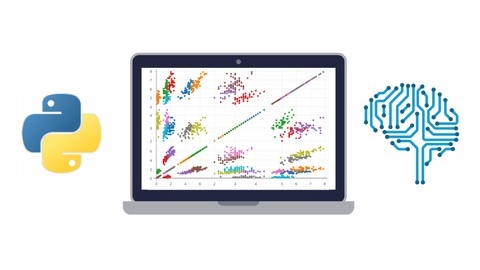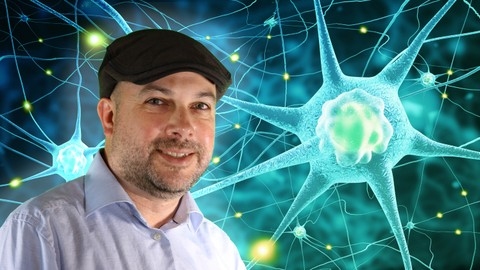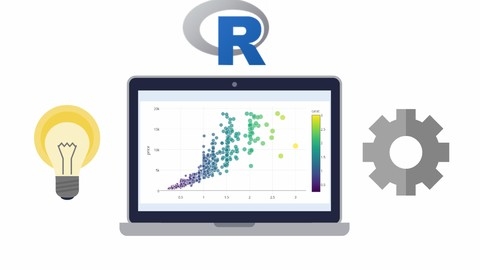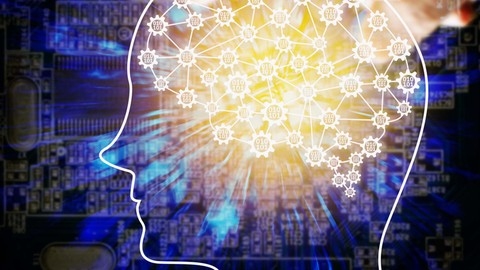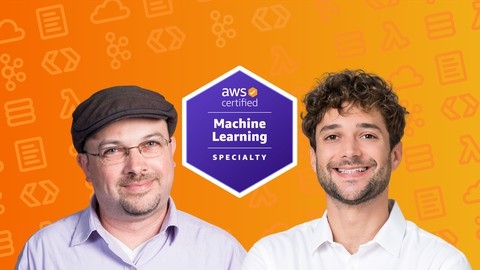Machine Learning A-Z: AI, Python & R + ChatGPT Prize [2024]
This course covers everything from data preprocessing to advanced topics like reinforcement learning and natural language processing (NLP), making it suitable for both beginners and experienced learners.
You’ll gain hands-on experience by working with real-world datasets in Python and R, applying your knowledge through practical exercises and quizzes.
The curriculum dives deep into regression, classification, clustering, and even explores cutting-edge areas like deep learning, including artificial neural networks (ANNs) and convolutional neural networks (CNNs).
You’ll also learn about the powerful XGBoost algorithm, model selection, and boosting techniques to evaluate and improve model performance.
A special focus is placed on dimensionality reduction techniques such as principal component analysis (PCA), linear discriminant analysis (LDA), and kernel PCA, essential for managing high-dimensional data.
The course emphasizes practical application, ensuring you’re ready to tackle machine learning challenges head-on.
Completing the course unlocks a special prize and an opportunity for a live training session on boosting your career in machine learning.
Python for Data Science and Machine Learning Bootcamp
This course begins with a straightforward introduction to Python and setting up your environment with Anaconda and Jupyter Notebooks, ensuring you have the necessary tools at your disposal.
Quickly moving on, you’ll dive into Python programming through an engaging crash course.
This section equips you with the foundational skills needed for data analysis, preparing you for the more complex topics ahead.
The course then guides you through essential libraries like NumPy and Pandas, pivotal for data manipulation, followed by an in-depth exploration of data visualization tools including Matplotlib, Seaborn, and Plotly.
These segments are packed with exercises and projects, allowing you to apply what you’ve learned in practical scenarios.
When it comes to machine learning, the course covers a broad spectrum of algorithms from Linear Regression to Neural Networks, offering both theoretical knowledge and Python implementation practices.
You’ll get hands-on experience with TensorFlow and Keras in the Neural Nets and Deep Learning section, preparing you for the latest advancements in the field.
Additionally, the course introduces Big Data and Spark with Python, teaching you how to handle large datasets using Spark and AWS.
This inclusion ensures you’re well-versed in a crucial aspect of modern data science.
By the end of this course, you’ll have completed several capstone projects, each designed to challenge your understanding and application of the course material.
Deep Learning A-Z 2024: Neural Networks, AI & ChatGPT Prize
Starting with an introduction to deep learning, the course quickly moves into practical applications, ensuring you understand the significance and potential of this technology.
The curriculum is divided into focused sections, each dedicated to a key aspect of deep learning.
You’ll start with Artificial Neural Networks (ANNs), learning about neurons, activation functions, and essential processes like gradient descent and backpropagation.
The course then guides you through Convolutional Neural Networks (CNNs) for image recognition, Recurrent Neural Networks (RNNs) for processing sequences, and dives into Self Organizing Maps (SOMs) and Boltzmann Machines for advanced modeling techniques.
A unique feature of this course is its hands-on approach, offering datasets, step-by-step tutorials, and challenges that allow you to apply what you’ve learned.
Additionally, the integration of ChatGPT as a learning tool provides an interactive experience to reinforce your understanding.
By the end, you’ll have practical experience in building and evaluating deep learning models, preparing you for a career in AI or enhancing your personal projects.
Machine Learning, Data Science and Generative AI with Python
Starting with setting up a Python environment tailored for scientific computing across Windows, Mac, or Linux, this course ensures you’re well-prepared.
It includes a Python crash course covering syntax, data structures, and functions, making it accessible if you’re new or returning to Python.
The curriculum progresses to foundational statistics and probability, applying these concepts through Python for a practical learning experience.
You’ll explore predictive models, including linear and polynomial regression, and delve into machine learning with supervised and unsupervised learning, Bayesian methods, and K-Means clustering.
A significant focus is on neural networks and deep learning, where you’ll learn to implement models using Tensorflow and Keras, and understand convolutional and recurrent neural networks.
The course also introduces you to the cutting-edge field of generative AI, including Variational Auto-Encoders (VAE’s) and Generative Adversarial Networks (GAN’s), for synthesizing realistic images.
Practical activities are integrated throughout, allowing you to apply concepts in real-world scenarios, from spam classifiers to movie recommendation systems.
The course culminates in a final project on mammogram image classification, challenging you to apply your learning.
Additionally, you’ll gain insights into deploying models, conducting A/B tests, and the ethical considerations in deep learning.
With the latest on Generative AI, including GPT and ChatGPT, this course equips you with the skills to tackle current and future challenges in machine learning and data science.
Deep Learning Prerequisites: The Numpy Stack in Python (V2+)
Starting with a clear introduction, it sets expectations on the learning outcomes and the practical application of skills acquired.
The course covers Numpy, introducing essential concepts like arrays, dot products, and matrices, which are foundational for numerical computations in Python.
Following Numpy, you’ll explore Matplotlib for data visualization, learning to create impactful charts and plots.
The Pandas section equips you with skills for data manipulation and analysis, crucial for handling real-world data sets.
Scipy is also covered, focusing on scientific computing techniques that are vital in machine learning tasks.
Practical exercises after each section provide hands-on experience, reinforcing your learning and preparing you for applying these skills in machine learning projects.
The course also addresses setting up your environment, ensuring you’re ready to use tools like TensorFlow and Theano, and offers Python coding assistance for beginners.
Complete A.I. & Machine Learning, Data Science Bootcamp
Starting with an introduction to the online classroom, this course fosters a supportive learning environment where you can easily ask questions and interact with peers and instructors.
You’ll quickly move into practical applications, exploring machine learning through engaging exercises like the Machine Learning Playground and building a YouTube Recommendation Engine.
The course breaks down complex topics into understandable segments, covering different types of machine learning, data evaluation, and the six-step machine learning framework.
Key sections include hands-on training in data manipulation with Pandas and NumPy, data visualization with Matplotlib, and model building with Scikit-learn.
You’ll tackle real-world projects on supervised learning, enhancing your problem-solving skills and applying theoretical knowledge in practical scenarios.
For those interested in the latest in A.I., the course also covers neural networks, deep learning, and TensorFlow 2, teaching you to manage unstructured data and leverage Google Colab and GPUs.
Beyond technical skills, you’ll learn to effectively present your work, ensuring you can communicate complex ideas clearly to various audiences.
Career advice, contributions to open source projects, and a thorough Python programming section are included to round out your education, making this bootcamp a solid foundation for anyone looking to enter the fields of machine learning and data science.
Data Science and Machine Learning Bootcamp with R
Starting with an introduction to data science and R programming, this course prepares you by covering setup procedures for Windows, Mac OS, or Linux, and familiarizes you with RStudio.
You’ll quickly move into practical programming, learning about variables, data types, and vector operations, along with essential data structures like matrices, data frames, and lists.
The course doesn’t stop at programming.
It extends into data manipulation, teaching you how to work with various data formats, including CSV and Excel, and even how to scrape web data.
This skill set is crucial for handling diverse data sources you’ll encounter in real-world scenarios.
Machine learning is at the core of this bootcamp, with detailed sections on linear and logistic regression, K-nearest neighbors (KNN), decision trees, random forests, support vector machines (SVM), and neural networks.
Each module includes a project, allowing you to apply theoretical knowledge to practical tasks, reinforcing your learning.
Data visualization skills are also covered, with tutorials on ggplot2 and Plotly, enabling you to create both static and interactive visualizations.
This is key for analyzing and presenting data effectively.
The capstone project culminates your learning experience, challenging you to apply all your acquired skills on a real-world problem.
Python for Machine Learning & Data Science Masterclass
Starting with an optional Python crash course, it caters to both beginners and those needing a quick refresher, covering essential programming concepts and environment setup with Anaconda and Jupyter.
The course quickly moves into core data science libraries, teaching you how to manipulate data using NumPy and Pandas, and visualize it with Matplotlib and Seaborn.
These skills are crucial for any aspiring data scientist, allowing you to clean, analyze, and present data effectively.
As you progress, the course dives deep into machine learning, starting with foundational algorithms like linear regression and logistic regression.
You’ll learn through hands-on coding, ensuring you understand both the theory and practical application of each model.
The curriculum also includes advanced topics such as K-nearest neighbors (KNN), support vector machines (SVM), decision trees, random forests, and boosting methods like AdaBoost and Gradient Boosting.
Unsupervised learning is also covered, with sections on K-means clustering, hierarchical clustering, and DBSCAN, alongside dimension reduction techniques like PCA.
These sections prepare you to tackle complex data sets and extract meaningful insights.
The course emphasizes real-world application, featuring exercises, projects, and a capstone project that challenges you to apply your learning to solve practical problems.
Finally, it concludes with a crucial skill in today’s data-driven world: model deployment.
You’ll learn how to make your machine learning models accessible as APIs, a vital step for any machine learning engineer.
Introduction to Machine Learning for Data Science
This course starts with a friendly introduction, offering tips to get the most out of your learning experience, and includes closed captioning for all students.
It breaks down complex concepts like artificial intelligence (AI), big data, and the differences between structured and unstructured data into understandable pieces.
You’ll explore the significant impact of machine learning on our lives, understanding its importance through real-world applications.
The course outlines the five-step machine learning process, guiding you from formulating the right questions to applying and presenting your model, ensuring you’re equipped to tackle any machine learning project.
As you progress, you’ll learn about essential tools for data science, including R, Python, SQL, Excel, and RapidMiner, with practical insights into each tool’s application.
The course also features a bonus section on using Python and Jupyter, where you’ll apply your skills to a real-world example: predicting Titanic survivors.
AWS Certified Machine Learning Specialty 2024 - Hands On!
Starting with the basics, you’ll quickly get up to speed on how to maximize your learning experience on Udemy, including adjusting video settings for optimal viewing.
The course kicks off with Data Engineering, teaching you to create data repositories and implement data-ingestion and transformation solutions, with practical exercises on Amazon S3, Kinesis, and Glue.
You’ll then dive into Exploratory Data Analysis, where you’ll prepare and analyze data for modeling using Python, Jupyter notebooks, and tools like Amazon Athena.
This section covers essential techniques for handling various data types and visualizing information effectively.
The modeling sections introduce you to the fundamentals of machine learning and deep learning, including neural networks, activation functions, and convolutional and recurrent neural networks.
You’ll also explore modern NLP with BERT and GPT, gaining hands-on experience with Amazon SageMaker for building, tuning, and deploying models.
For those interested in high-level machine learning services, the course covers AWS services like Amazon Comprehend, Translate, Transcribe, Polly, and Rekognition, teaching you how to apply these for tasks such as natural language processing and computer vision.
The course also focuses on ML Implementation and Operations, guiding you through deploying machine learning solutions securely and efficiently on AWS.
Plus, an optional section on Generative AI introduces you to the latest in Transformers, GPT, and foundation models.

![Machine Learning A-Z: AI, Python & R + ChatGPT Prize [2024]](/img/best-machine-learning-courses-udemy/950390_MachineLearningA-ZAIPythonRChatGPTPrize2024.jpg)
